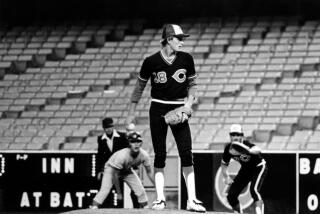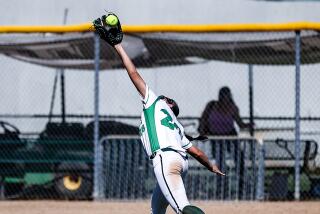He’s an Unemployed Pitchman
AGOURA HILLS — Recirculated water trickles into the blue-bottom pool, interrupting the morning silence as Dave Schmidt sits in a patio chair on the handsome stone deck, occasionally sipping juice from a tall plastic cup.
Most days he is at Wood Ranch Country Club in Simi Valley, polishing his three-handicap golf game and unwinding from a fruitful but sometimes frustrating baseball season as UCLA’s pitching coach.
But this morning, the former pitcher at Granada Hills High, Valley College, UCLA and the major leagues is talking baseball in his backyard.
Schmidt, 39, just concluded his third and, apparently, last season as an assistant to UCLA Coach Gary Adams. The Bruins finished third in the Pacific 10 Southern Division and were invited to the NCAA tournament, but fizzled in the Central I regional, falling one game short of the College World Series in Omaha, Neb.
For Schmidt, it was a bitter disappointment.
“It was a letdown,” he said. “I thought we should have gone [to the series]. But close only counts in hand grenades.”
After the season, Schmidt resigned from UCLA for reasons he won’t discuss in detail but that essentially centered on philosophical differences with Adams.
“I played for Gary,” Schmidt said. “He gave me an opportunity to coach. I will always be grateful for that. Our families are very close, also. I consider them good friends. I wanted it to remain that way.
“Once the baseball game starts, we are very different people. I can’t ask him to change for me. That would be unfair. Being a little bit stubborn, I found it hard to change, also. It wasn’t his job to change for me. He’s the head coach and it’s his program and he’s been very successful. . . . It was a difficult decision to leave.”
As a pitcher, Schmidt constantly had to face tough decisions in his career.
Should he try to sneak a fastball past this batter? Could he sucker that one into chasing a breaking pitch? Would the next one fall for another hard slider?
The choice Schmidt made to leave the Bruins was no different. But at least it had a silver lining. For one, it has given him more time to play golf and to spend with his wife, Debbie, and their four children, Brian, 11; Tanya, 9; Alexa, 5, and Alana, 2.
“Brian loves sports,” Schmidt said. “I’m encouraging him to play a lot of different sports to get the feel of them. . . . Right now, I’m content with helping my son in his athletics and academics, as well as my three daughters.”
*
Schmidt learned early about family values and the importance of a solid education.
Born in Niles, Mich., Schmidt and his family moved to Northridge when he was about 3. His parents, who are retired and living in Atlanta, were school teachers who expected their son to hit the books with the same determination as a fastball.
“I didn’t play organized sports until I was 11 years old,” Schmidt said. “I was expected to go straight home from school and do my homework before one of my parents got home. Then I could go out and play.”
By the time Schmidt grew closer to entering high school, his parents moved the family a few blocks west in the same neighborhood so Schmidt and his sister could attend Chatsworth High. But the district boundaries were realigned, placing the home in the Granada Hills attendance area.
With one stroke of a pen, Chatsworth’s loss became Granada Hills’ gain.
At Granada Hills, Schmidt developed into an outstanding athlete. He played guard on the basketball team, helping the Highlanders to a 10-0 record and first place in the six-team Mid-Valley League in his senior season in 1975, but his real success came on the baseball field.
“He was a tremendous competitor,” said Darryl Stroh, who recently retired after 27 seasons as Highlander baseball coach. “He threw a slider, which was a relatively new pitch for high school kids at the time, and he threw it real well.”
With the right-hander mowing down opponents, the Highlanders claimed the league title and a City championship, the first of five won by the school under Stroh. Schmidt finished 6-2 in league play with 53 strikeouts in 63 innings and batted .302. During one stretch, he pitched 44 1/3 consecutive scoreless innings. The streak ended on a bases-loaded catcher’s interference call.
That team, like many others coached by Stroh, relied on fundamentals and execution. It also featured a trademark Stroh weapon.
“One thing I remember about our offense was the squeeze bunt,” said Schmidt, who batted third in the lineup. “We practiced it so much. [Stroh] would crank up a pitching machine as high as it would go, then he would line us up and all of us had to put down a bunt in fair territory. We couldn’t go home until we all got one down.
“He found something that gave us a physical edge and a psychological advantage. We knew that if we got a runner to third, we would score him nine out of 10 times.”
The Highlanders used their favorite tool to win the 1975 City title, scoring the decisive run in a 4-3 victory over Westchester on a squeeze in the bottom of the seventh inning.
Schmidt started that game at Dodger Stadium but was ineffective and left-hander Dave Finch was the winning pitcher.
“I gave up a home run in the first inning,” Schmidt said. “It was obvious I just didn’t have it that night. [Stroh] brought in Dave and he did a great job. I went to play left field. . . . I was completely in awe [of the stadium]. The size of the stadium. The condition of the field. Playing on it was a little distracting for me and I wasn’t able to concentrate on the job at hand.”
Schmidt was named to the All-City team, which included future major leaguers Floyd Rayford of Manual Arts and DeWayne Buice of Carson, and Charlie Young of Taft, who later played football at USC. But neither Schmidt nor anyone else on that year’s Granada Hills team was drafted.
“That was the start of ‘You can’t throw hard enough,’ ” Schmidt said. “I had no scholarship offers, so I went to Valley because I thought I had a chance to be a starter there.”
After Valley, Schmidt accepted a scholarship to UCLA and left three years later with a 24-7 record, the third-best mark for career victories in Bruin history.
He was picked by Texas in the 27th round of the 1979 draft and was called up to the Rangers after 1 1/2 seasons in the minors.
*
Schmidt was primarily a reliever in the major leagues.
In 1982, he appeared in 33 games and was 4-6 with a 3.20 earned-run average before undergoing elbow surgery in September to remove bone spurs.
Two years later, Schmidt had his best season with the Rangers, making a team-high 43 appearances and saving 12 games. During one three-month stretch, he allowed only three earned runs and finished with a 2.56 ERA.
Schmidt was traded to the Chicago White Sox in 1986 and signed with Baltimore as a free agent in 1987. The Orioles remain Schmidt’s favorite franchise.
“That’s a quality organization,” he said. “They have the most loyal and most knowledgeable fans in baseball. I played for Cal Ripken Sr. and it was a very rewarding experience for me to know that family. When I think of a baseball man, I think of Senior.”
In 1987, Schmidt enjoyed one of his most productive seasons, finishing with a 10-5 record and a 3.77 ERA. On July 12, he pitched his best major-league game only hours after one of his worst.
“It was the weekend before the All-Star break and I started against the [Minnesota] Twins on Friday night and they knocked me out in the first inning,” Schmidt said. “Both teams scored a lot of runs and after the game Senior called me into his office and said, ‘I went through everyone [pitchers] tonight. You think you can start again on Sunday? Just give me what you got.’
“So Sunday, an afternoon game, I got a perfect game through six innings and ended up pitching a two-hit shutout. To me, that shows the kind of pitcher I was. I nearly always pitched one of my better games after I pitched one of my worse games.”
Schmidt missed the final six weeks of the season because of bone spurs in the elbow that required surgery. He played two more years with the Orioles and, after stints with Montreal and Seattle, retired during spring training with the Angels in 1993.
“The competitive fire just wasn’t there anymore,” Schmidt said. “I didn’t think I was going to last the whole year and I didn’t want to start if I wasn’t going to finish. . . . I found myself going to spring training games wishing I was at home. I haven’t really regretted the decision. I wanted to retire on my own terms. I didn’t want to just hang around.”
For now, that’s what Schmidt is doing, although he prefers to do it with a golf club in his hand. His pro contracts made him financially secure and able to pick and choose his endeavors. He’d like to join the Celebrity Golf Assn. in the fall, is considering giving private pitching lessons and would consider returning to coaching.
“I loved the coaching part of it,” Schmidt said. “It’s always nice to help a person realize his potential.”
More to Read
Go beyond the scoreboard
Get the latest on L.A.'s teams in the daily Sports Report newsletter.
You may occasionally receive promotional content from the Los Angeles Times.






